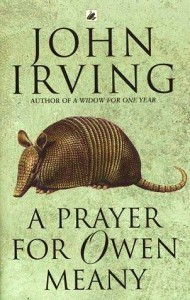Dreadful. And now I can hardly remember what I’ve read all summer (and autumn…). I’m bound to leave something out.
Anyway:
The Imperfectly Natural Baby and Toddler – Janey Lee Grace
Interesting and contains lots of tips for things I hadn’t heard about before, but reads a blit like a list of weblinks at times (this is good for usefulness but for readability? Not so good.)
First Among Sequels – Jasper Fforde
Brilliant, but missing something that I can’t put my finger on. Still, definitely brilliant. Just not quite perfect.
A Widow for One Year – John Irving
Yay! I finally got around to finishing a John Irving novel! I brought A Widow for One Year to Austria planning to release it once I’d finished, but somehow didn’t get as much reading done as I’d intended. For a long time I thought I might just leave it even if I didn’t finish, as I didn’t feel compelled to keep reading, even half-way through the book, but that would have entailed having to buy something else to read, and I never found anything I wanted to buy. By the time we were packing our bags to go home I only had a couple of hundred pages left, and found that the story had grown on me and that suddenly I could hardly put it down. Strange stuff. I might just have to buy some more Irving (especially if I find more cheap second-hand copies like this one).
Death at La Fenice – Donna Leon
A bookcrossing copy I picked up in Vienna. Pretty entertaining, I’ll probably read more Leon.
The Sound and the Fury – William Faulkner
On the 1001 books list. I can see why.
Intimacy – Hanif Kureshi
Also on the 1001 books list, which is why I read it. That is, I read the story actually entitled Intimacy, and struggled to get through that, despite its relative briefness and it’s status as a «classic». I’m sure it’s a brilliant portrayal of a middle-aged guy planning to leave his wife, but I just thought it was dreary. I then read the following story in the book, something Night-ish, and found that it was basically about a middle-aged guy who’d left his wife. And then I gave up. I’m sure I’m at fault rather than Kureshi, we all have our hang-ups and one of mine is that my empathy fuse blows when you mix infidelity into the story and so I fail to connect with the characters at all, which takes the fun out of it.
So Many Books, so Little Time – Sarah Nelson
Unfortunately not as good as I’d hoped. As many of the other readers of the bookcrossing-copy I read I would have liked more books and less life, I guess, but my main gripes were with Nelson’s way of presenting herself and her reading. Firstly, she talks about her «discovery» that you really don’t have to finish books you don’t like as if it’s something profound – a rite of passage, «growing up» – which rather irritated me, but then she goes on to say that she doesn’t want to discuss or give her opinion on books she’s given up on. What? You read 200 pages of a 400 page novel and then decide you really can’t be bothered to finish it, but you maintain that you don’t have the «right» to say that the book sucked (or wasn’t quite to your taste) since you didn’t stick with it to the bitter end? Seriously, if a novel doesn’t manage to capture your attention sufficiently to make you finish it has fundamentally failed in its object and you’re entitled to say whatever you like (well, ok, I’d stay away from such statements as «the ending sucked» if you haven’t actually read the ending, but you know what I mean…). It made me suspect that Nelson really hasn’t «grown up» and that she’s still uncomfortable about leaving books unfinished, for all her protestations that this is something she has learned to do. The other is with the project itself: She reads books for a living, for goodness sakes, and still 50 books a year seems to have been a daunting task? Even last year, when I really didn’t read a lot, I read that much, and I’m up to 43 (and two halves) this year, despite giving birth in January (which everyone told me would be the death of reading novels, as I’d never be allowed to, or indeed able to, concentrate for long enough). I’m not impressed.
The World According to Bertie – Alexander McCall Smith
Perfect, as usual.
The Complete Polysyllabic Spree – Nick Hornby
 As I was contemplating what to say about this book, Julie’s blog entry about it somehow showed up in my rss-feed (even though it’s published in October). She says pretty much exactly what I thought, and it also echoes the opinion of most of the members of the reading circle I discussed it with: I like it, but I have no idea why.
As I was contemplating what to say about this book, Julie’s blog entry about it somehow showed up in my rss-feed (even though it’s published in October). She says pretty much exactly what I thought, and it also echoes the opinion of most of the members of the reading circle I discussed it with: I like it, but I have no idea why.